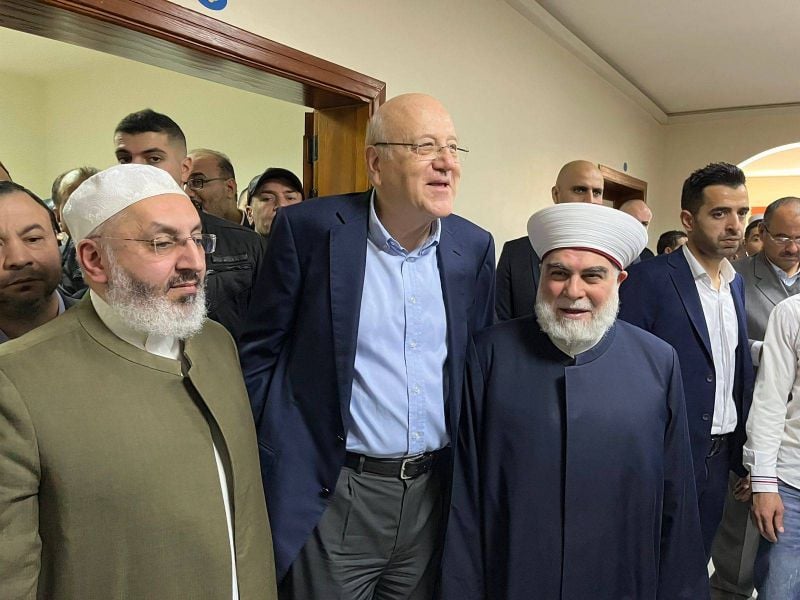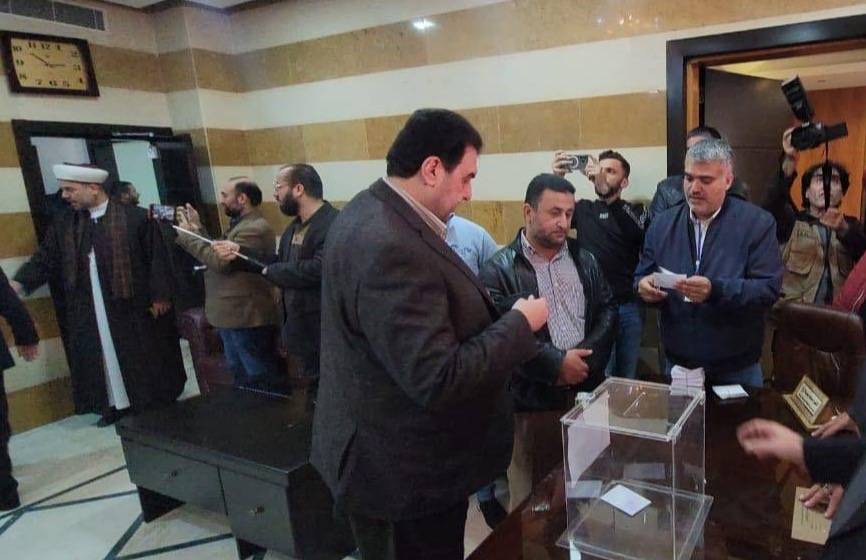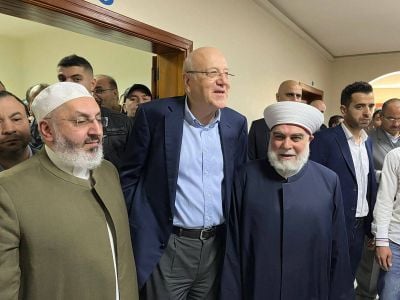
Caretaker Prime Minister, Najib Mikati (center), during the elections of the muftis of the regions in Lebanon on Dec. 18, 2022. (Credit: Twitter/@grandserail)
BEIRUT — For the first time in 40 years, elections for muftis were held Sunday in six Lebanese regions, in a vote to appoint six dignitaries of the highest Sunni religious body in the country, two years after the end of their mandate.
Contacted by L'Orient Today, the head of communications of Dar al-Fatwa, Khaldoun Kawas, explains that during the last 40 years, it was the mufti of the republic who appointed the regional muftis. "But this year, the conditions are right for holding elections," he said, without further explanation. In 1982, Lebanon was invaded by the Israeli army, in the middle of a civil war that began in 1975 and did not end until 1990. Following the end of the way, a 15 years of Syrian regime tutelage ensued, until the departure of Syrian troops in 2005.
"Mufti [ of the Republic Abdul Latif] Derian preferred to hold these elections because … religious decentralization is necessary to ensure the needs of the population," a source informed of the process told L’Orient Today’s correspondent in the Bekaa. This source said that the mufti of a region remains in office until the age of 70 years. The mufti of the republic remains at the head of Dar al-Fatwa until the age of 72 years.
Sunday's elections began in the morning in Tripoli, Akkar, Zahle, Rashaya, Baalbeck-Hermel, and Hasbaya-Marjayoun, all of which are located in the North and the Bekaa. The elections were called by Derian, who, according to local media, said he was at "equal distance from all candidates," describing the election as "a significant event on the Lebanese level."
'No political interference'
The army and security forces were deployed outside the polling stations. Caretaker Prime Minister Najib Mikati voted Sunday morning in his home city, Tripoli. "There is absolutely no political interference in these elections. We have respect and affection for all candidates," he was quoted by the state-run National News Agency as saying.
Caretaker Interior Minister Bassam Mawlawi also voted on Sunday. "The atmosphere is excellent," he said after casting his ballot in Tripoli.
 MP Walid Baarini slipping his ballot into the ballot box on Dec. 18, 2022 during the muftis elections. (Credit: photo sent by Michel Hallak/L'Orient Today)
MP Walid Baarini slipping his ballot into the ballot box on Dec. 18, 2022 during the muftis elections. (Credit: photo sent by Michel Hallak/L'Orient Today)
Several Sunni MPs took part in the vote, such as Abdul Karim Kabbara, Mohamad Yehia and Walid Baarini in the north, according to L’Orient Today’s correspondent in the region.
The General Directorate of Islamic Waqfs is responsible for determining who can vote. Those permitted to vote include the incumbent prime minister, former prime ministers, members of the Supreme Islamic Council, Sunni legal judges, the president of the Waqfs, imams, Sunni members of the Constitutional Council and Sunni first class civil servants, as well as Sunni members of municipal councils and personalities considered to be part of the political and religious elite of the Sunni community.
Results
According to a statement from Dar al-Fatwa, Sheikh Mohammad Tarek Imam was elected mufti of Tripoli with 66.40 percent of the votes, Sheikh Zaïd Mohammad Bakkar Zakaria became mufti of Akkar with 45.56 percent of the votes, Sheikh Ali Ghazzaoui was elected mufti of Zahle with 56.60 percent of the votes, Sheikh Wafic Hijazi became mufti of Rashaya with 85.70 percent of the votes, Sheikh Ayman Rifai became mufti of Baalbeck-Hermel with 65 percent of the votes and Sheikh Hassan Dalleh was elected mufti of Hasbaya-Marjayoun with 80.95 percent of the votes.
"The election of the muftis today is a clear message to all political forces in Lebanon to hurry up and elect a president of the republic who unites the Lebanese and respects the constitution and the National Pact, as well as the Taif Agreement that brought Lebanon out of its conflicts," Derian said in a statement reported by the National News Agency.
In Lebanon, Dar al-Fatwa has a relatively influential political role with Sunni officials, including the prime minister, as this position is reserved for this community under the National Pact of 1943. Derian was reputedly close to former Prime Minister Saad Hariri, who retired from politics in January.
Additional reporting by Michel Hallak and Sara Abdallah.
